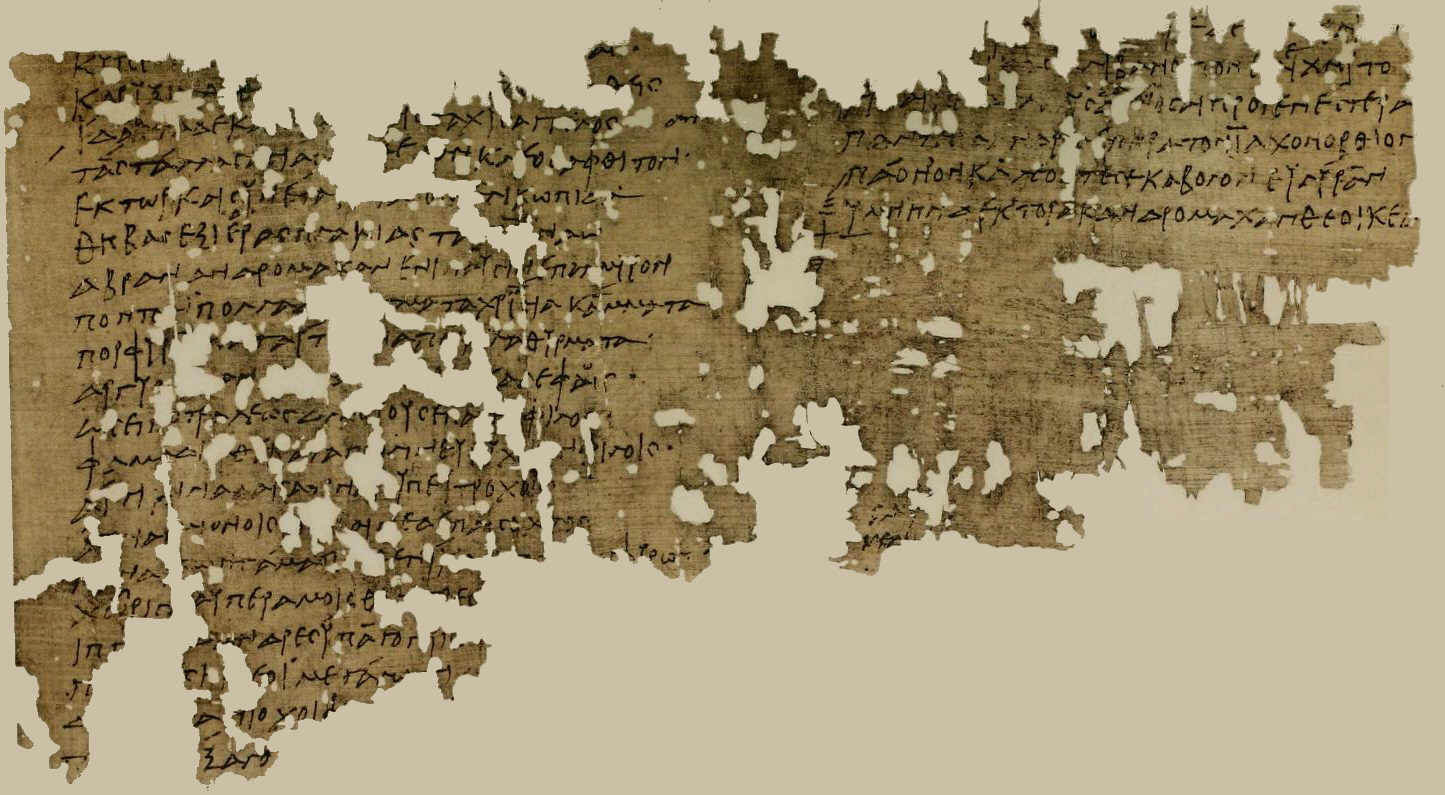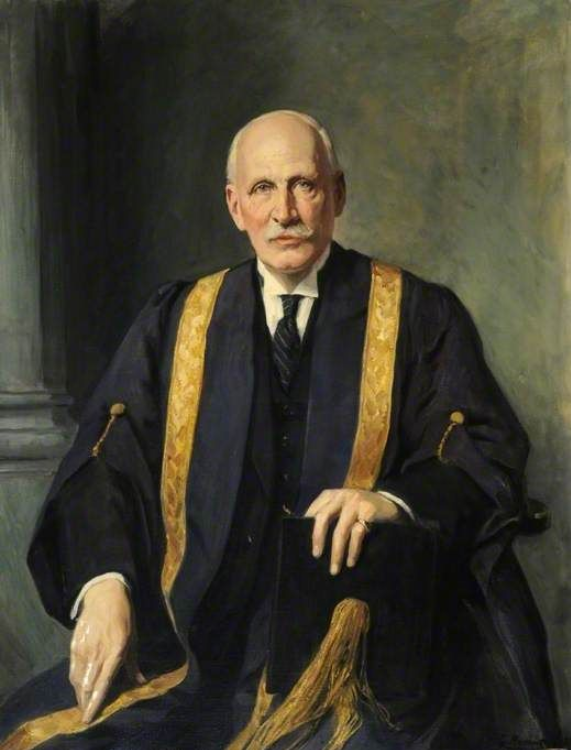|
Edgar Lobel
Edgar Lobel (24 December 1888 – 7 July 1982) was a Romanian-British classicist and papyrologist who is best known for his four decades overseeing the publication of the literary texts among the Oxyrhynchus Papyri and for his edition of Sappho and Alcaeus in collaboration with Denys Page. His contributions to the fields of papyrology and Greek studies were many and substantial, and Eric Gardner Turner believed that Lobel should "be acknowledged as a scholar to be mentioned in the same breath as Porson and Bentley, a towering genius of English scholarship." Early life and education Lobel was born in Iași, Romania on 24 December 1888. As a youth he moved to Higher Broughton with his parents Amelia and Arthur Lobel, a shipowner. He was educated at Kersal School before moving on to Manchester Grammar School where he was head boy and won a scholarship to Balliol College, Oxford in 1906. Despite the fact that his father had been compelled by poverty to emigrate to the United States, ... [...More Info...] [...Related Items...] OR: [Wikipedia] [Google] [Baidu] |
Mary Lobel
Mary Doreen Lobel (née Rogers) (25 June 1900 – 1 December 1993) was a historian who edited several volumes of the ''Victoria County History'' and a three-volume ''British Atlas of Historic Towns''. Biography Lobel was born Mary Doreen Rogers in Bristol on 25 June 1900.. Her father, Frederick William Rogers was a stone merchant and her mother was Blanche Mary, née Lyons. The family were strong suffragists, and would entertain suffragist gatherings. She was educated at Clifton High School and helped Walter Ewing Crum with cataloging translations for his Coptic dictionary. Through Crum, she met Edgar Lobel, a research student 12 years her senior, and the couple were effectively engaged by 1918. In 1919, Lobel attended St. Hugh's College, Oxford, reading history and taught history at Norwich High School after she graduated in 1922. The Lobels married on 24 August 1927 and moved to Oxford. Edgar died in 1982 and Lobel lived alone, suffering from Alzheimer's disease. She mov ... [...More Info...] [...Related Items...] OR: [Wikipedia] [Google] [Baidu] |
Richard Bentley
Richard Bentley FRS (; 27 January 1662 – 14 July 1742) was an English classical scholar, critic, and theologian. Considered the "founder of historical philology", Bentley is widely credited with establishing the English school of Hellenism. In 1892, A. E. Housman called Bentley "the greatest scholar that England or perhaps that Europe ever bred". Bentley's ''Dissertation upon the Epistles of Phalaris'', published in 1699, proved that the letters in question, supposedly written in the 6th century BCE by the Sicilian tyrant Phalaris, were actually a forgery produced by a Greek sophist in the 2nd century CE. Bentley's investigation of the subject is still regarded as a landmark of textual criticism. He also showed that the sound represented in transcriptions of some Greek dialects by the letter digamma appeared also in Homeric poetry, even though it was not represented there in writing by any letter. Bentley became Master of Trinity College, Cambridge in 1700. His autocrat ... [...More Info...] [...Related Items...] OR: [Wikipedia] [Google] [Baidu] |
Wilhelm Schubart
Friedrich Wilhelm Ludwig Schubart (21 October 1873 – 9 August 1960) was a German ancient historian. He was a leading authority in the field of papyrology. Schubart was born on 21 October 1873 in Liegnitz, then part of the German Empire. He studied classical philology and philosophy at the Universities of Tübingen, Halle, Berlin and Breslau, earning his PhD at the latter institution in 1897. In 1900 he obtained his habilitation in ancient history at Berlin, becoming an associate professor in 1912. From 1931 to 1937 he was an honorary professor in Berlin, later serving as a professor of ancient history at the University of Leipzig (1948–1952).Professorenkatalog der Universität Leipzig Biographical sketch From 1901 to 1912 he worked as an assistant director at the [...More Info...] [...Related Items...] OR: [Wikipedia] [Google] [Baidu] |
Arthur Surridge Hunt
Arthur Surridge Hunt FBA (1 March 1871 – 18 June 1934) was an English papyrologist. Life Hunt was born in Romford, Essex, England. Over the course of many years, Hunt, along with Bernard Grenfell, recovered many papyri from excavation sites in Egypt, including the Oxyrhynchus Papyri. He worked with Campbell Cowan Edgar on a translation of the Zenon Papyri from the original Greek and Demotic. In 1913, he became Professor of Papyrology at Oxford, succeeding to his lifelong friend and colleague Grenfell, whose professorship lapsed due to the latter’s breakdowns and depression. In January 1918, he married Lucy Ellen, daughter of Surgeon-Major-General Sir A. F. Bradshaw, but during the next few months their only child died. Awards * Appointed Corresponding Fellow of the British Academy. * 1894 – Elected to the Craven Fellowship. Publications *Grenfell, Bernard Pyne and Hunt, Arthur Surridge, ''Sayings of Our Lord from an early Greek Papyrus'' (Egypt Explorati ... [...More Info...] [...Related Items...] OR: [Wikipedia] [Google] [Baidu] |
Gilbert Murray
George Gilbert Aimé Murray (2 January 1866 – 20 May 1957) was an Australian-born British classical scholar and public intellectual, with connections in many spheres. He was an outstanding scholar of the language and culture of Ancient Greece, perhaps the leading authority in the first half of the twentieth century. He is the basis for the character of Adolphus Cusins in his friend George Bernard Shaw's play ''Major Barbara'', and also appears as the chorus figure in Tony Harrison's play '' Fram''. He served as President of the Ethical Union (now Humanists UK) from 1929 to 1930 and was a delegate at the inaugural World Humanist Congress in 1952 which established Humanists International. He was a leader of the League of Nations Society and the League of Nations Union, which promoted the League of Nations in Britain. Murray died in Oxford in 1957, aged 91. His ashes were interred in Poets' Corner, Westminster Abbey. Early life Murray was born in Sydney, Australia. He ... [...More Info...] [...Related Items...] OR: [Wikipedia] [Google] [Baidu] |
Gaisford Prize
The Gaisford Prize is a prize awarded by the Faculty of Classics, University of Oxford for a composition in Classical Greek Verse and Prose by an undergraduate student. The prize was founded in 1855 in memory of Dr Thomas Gaisford (1779–1855). The prizes now also include the Gaisford Essay Prize and the Gaisford Dissertation Prize. History Dr Thomas Gaisford, Dean of Christ Church, Regius Professor of Greek in the University of Oxford for more than forty years (1811–1855), died on 2 June 1855. Ten days later, at a meeting held in Christ Church on 12 June, it was resolved to establish a prize in his honour, to be called the Gaisford Prize, and to raise for that purpose £1,000 by public subscription, the interest to be applied "to reward a successful prizeman or prizemen, under such regulations as shall be approved by Convocation". The prizes were first awarded in 1857. There have been four categories of Gaisford Prize. The two original categories were: * Gaisford Priz ... [...More Info...] [...Related Items...] OR: [Wikipedia] [Google] [Baidu] |
Arthur Wallace Pickard-Cambridge
Sir Arthur Wallace Pickard-Cambridge, (20 January 1873 – 7 February 1952) was a British classicist, Professor of Greek at the University of Edinburgh, and one of the greatest authorities on the theatre of ancient Greece in the first half of the 20th century. Pickard-Cambridge was born in Bloxworth Rectory, the son of the Reverend Octavius Pickard-Cambridge (1828–1917), a naturalist and entomologist. He served as a fellow and tutor at Balliol College, Oxford (1897-1929).British Academy fellowship record Following the accidental death (in a fire) of Prof. Alexander William Mair he became Professor of Greek at the |
Cyril Bailey
Cyril Bailey, CBE, FBA (13 April 1871 – 5 December 1957) was an English classicist. He was a fellow and tutor at Balliol College, Oxford, from 1902 to 1939. Early life He was born on 13 April 1871 to Alfred Bailey, a barrister and legal scholar, and his wife Fanny Margaret, ''née'' Coles, a merchant's daughter. His godfather (and cousin) was the banker and classical scholar Sir Walter Leaf. Cyril attended St Paul's School in London, before studying classics at Balliol College, Oxford (1890–94); he won the Craven and Hertford scholarships.Jasper Griffin"Bailey, Cyril" ''The Oxford Dictionary of National Biography'' (online ed., Oxford University Press, 2013). Retrieved 10 February 2021. Academic career and honours After graduating with a first-class degree, Bailey was elected a fellow and tutor at Exeter College, Oxford, in 1894. He left there in 1902, when he returned to Balliol as a fellow. He remained there for thirty seven years before retiring in 1939. A popular c ... [...More Info...] [...Related Items...] OR: [Wikipedia] [Google] [Baidu] |
Lucretius
Titus Lucretius Carus ( ; ; – October 15, 55 BC) was a Roman poet and philosopher. His only known work is the philosophical poem '' De rerum natura'', a didactic work about the tenets and philosophy of Epicureanism, which usually is translated into English as ''On the Nature of Things''—and somewhat less often as ''On the Nature of the Universe''. Very little is known about Lucretius's life; the only certainty is that he was either a friend or client of Gaius Memmius, to whom the poem was addressed and dedicated. ''De rerum natura'' was a considerable influence on the Augustan poets, particularly Virgil (in his ''Aeneid'' and ''Georgics'', and to a lesser extent on the '' Eclogues'') and Horace. The work was almost lost during the Middle Ages, but was rediscovered in 1417 in a monastery in Germany by Poggio Bracciolini and it played an important role both in the development of atomism (Lucretius was an important influence on Pierre Gassendi) and the efforts of ... [...More Info...] [...Related Items...] OR: [Wikipedia] [Google] [Baidu] |
Head Boy
The two Senior Prefects, individually called Head Boy (for the male), and Head Girl (for the female) are students who carry leadership roles and are responsible for representing the school's entire student body. Although mostly out of use, in some schools, especially when there is only one of them, they are referred to The Senior Prefect (or SP for short). They are normally the most senior Prefect#Academic, prefects in the school. The terms are commonly used in the Education in the United Kingdom, British education system as well as in schools throughout some Commonwealth of Nations, Commonwealth countries, e.g. Nigeria and South Africa. Some schools use alternative, gender-neutral titles such as school captain, head pupil/student, head of school, or they adopt the American title of student body president. Head boys and head girls are usually responsible for representing the school at events, and will make public speeches. They also serve as a role model for students, and may share ... [...More Info...] [...Related Items...] OR: [Wikipedia] [Google] [Baidu] |
Manchester Grammar School
The Manchester Grammar School (MGS) is a highly Selective school, selective Private_schools_in_the_United_Kingdom, private day school for boys aged 7-18 in Manchester, England, which was founded in 1515 by Hugh Oldham (then Bishop of Exeter). It is the largest private day school for boys in the United Kingdom and has been described as “one of Britain’s most prestigious independent day schools”, known for its strong academic focus; having educated politicians, leading journalists, diplomats, Nobel laureates, poets, as well as Academy Awards, Academy Award and British Academy of Film and Television Arts, BAFTA award-winning actors and directors. Originally named ‘The Manchester Free Grammar School for Lancashire Boys’, The Manchester Grammar School was founded by Hugh Oldham in 1515 adjacent to Manchester Cathedral, Manchester Parish Church as a Grammar school#free tuition, free grammar school and as the first school in Manchester. The school grounds slowly expanded ... [...More Info...] [...Related Items...] OR: [Wikipedia] [Google] [Baidu] |





